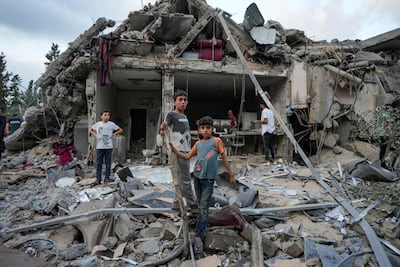Live updates: Follow the latest on Israel-Gaza
Reconstruction of Gaza will cost nearly $40 billion, a senior UN development official told The National on Thursday, as he urged public and private sector donors to contribute to postwar plans.
Abdullah Al Dardari, assistant secretary general and director of the UN Development Programme (UNDP) Regional Bureau for Arab States, said the agency’s early recovery phase of three to five years for Gaza would cost about $2 billion. The fund will be used mainly to remove debris, ensure basic services are running and start the reconstruction of some houses.
"Some donors have to be aware that they will have to take a risk by investing a little bit of money," he said. "That's why we said let's have $2 billion [at first], a process that allows us to provide dignified livelihood for up to a million Palestinians, that will push the number to up to $3 billion, but still, it's within reasonable means."
The long-term reconstruction plans will take decades to complete, he said, adding that the agency is faced with a funding issue.
“We are faced with a dilemma but no one is willing to invest big amounts of money in Gaza, before they see a serious, credible peace process. But to see a serious and credible peace process, again, we don't know what that would take,” Mr Al Dardari said.
The Gaza Strip has been under brutal bombardment by Israel since early October. Large areas across the enclave have been reduced to rubble, and more than 34,500 people have been killed while some are still trapped under debris.
Clearing and rebuilding destroyed areas will be slow and dangerous due to threats of mines and missiles buried under collapsed or damaged buildings.
UNDP teams are currently in Gaza assessing the impact. They found that 26 out of 30 municipalities have ceased working, Mr Al Dardari said.
Civil services and communities "no longer have any type of machinery, they cannot manage solid waste, they cannot provide any municipal services".
So far, the UNDP assessed that more than 70 per cent of homes in Gaza have been destroyed but the agency warned the figure could reach 80 or 90 per cent as the war continues.
The top UN official warned an attack on the southern city of Rafah, where about 1.5 million Palestinians are seeking shelter, could alter these predictions.

"Based on the assessments, we've been building our plans and creating what we call a flexible planning framework, simply because we really don't know what's going to happen and how things would look, who will be running the things on the ground. Who are we going to be working with? Is there going to be an attack or Rafah or not? Because then the scenarios will change."
Israel’s war in Gaza has created 37 million tonnes of debris, much of it laced with unexploded bombs, which could take more than a decade to remove, Mr Al Dardari said.
"In the 2014 war, we had 2.4 million tonnes of debris after 51 days of fighting. Today, we have 37 million tonnes and the number is increasing every day."
Uncertainty on the outcome of the peace process has left the international community unsure of when to begin providing civilians with the services, he added.
"We are doing very intricate planning, what we call just-in-time planning. We would have to start working on the removal of the debris immediately on day one," he said, in reference to the day after the war ends.
Mr Al Dardari said the work would start in the north of Gaza to allow those displaced to return home.
"The most dangerous times in any post-conflict situation is when there is a ceasefire and we are not ready to step in with some sort of livelihoods, rebuilding and economic recovery," he said.
The agency urged private sector donors to step up as their contribution would speed up the recovery process.
"Should we wait? And then it is too late? Or should we take the risk and invest some money now ... but it will pay off? Should there be a ceasefire, and we will move in quickly, that is a dilemma everybody is dealing with."
Mr Al Dardari said his team has been planning for the day after the war ends since the start of the fighting, and Gaza "cannot afford" six or eight more months of planning to start the implementation work. "So help us do that, please," he said.


